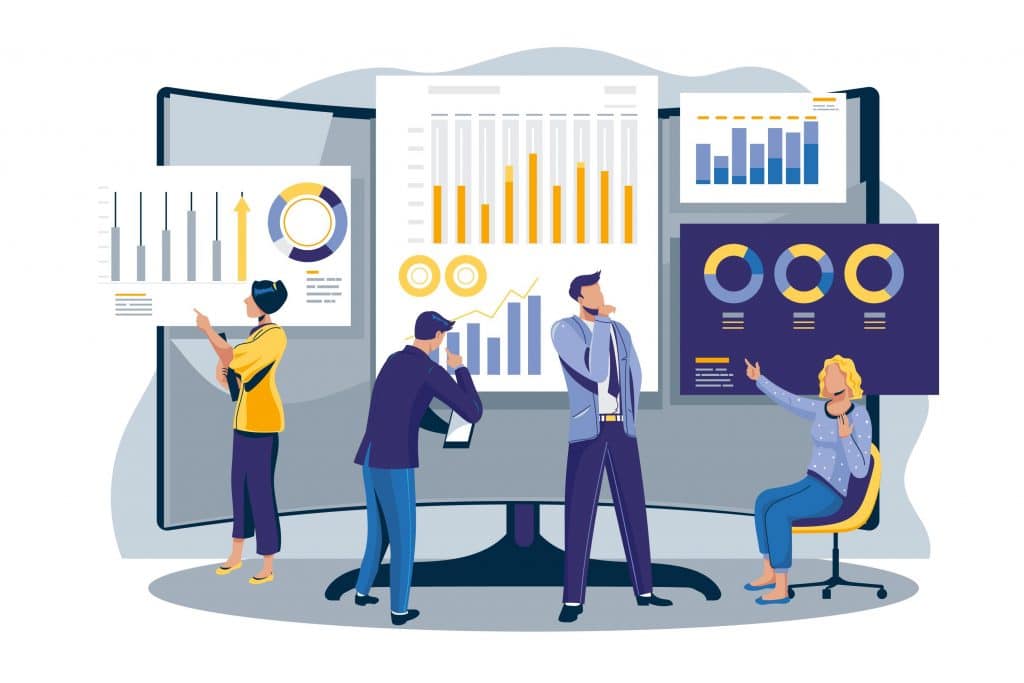In today’s digital age, online events have become increasingly popular. They offer a great opportunity for businesses and organisations to connect with their audience. Nevertheless, it requires more than just impeccable content and presentation abilities to ensure the success of these events. It’s also crucial to make use of data and assess online event analytics.
Organising online events such as webinars, virtual conferences, or live streams presents a unique opportunity to connect with people from all over the world. However, merely having compelling content to share is not sufficient for ensuring the success of your virtual events.
To thoroughly ensure success, online event analytics is a valuable resource that allows you to gather, analyse, and interpret data related to your online events. It serves as a guide that assists you in understanding how participants behave during your event, which segments they enjoy the most, and how well your event is performing overall. By measuring these factors, you can accurately determine if your event was a success.
In this article, we’ll take a closer look at online event analytics. We’ll talk about the basics, what important numbers to keep an eye on, and how to utilise the data to make your events even better. By the end, you’ll know how to measure the success of your online events and make them more valuable, boosting your event ROI. Let’s dive deeper!
Definition of Online Event Analytics
To begin, we’ll take a look at the fundamental concept of online event analytics. So, what does it mean? According to AT Internet, it’s all about collecting and studying information connected to virtual events. These could be things like webinars, virtual conferences, live video sessions, and other online gatherings.
When you use online event analytics, you’re gathering important facts and figures about how well your event is doing. It’s like having a treasure trove of insights into your event’s performance.
This data helps you make smart choices based on facts and not guesses. It’s like having a map to guide you through the event landscape, showing you what’s working well and what needs improvement. So, online event analytics is like having a secret weapon to make your online events even better!
Benefits of Using Online Event Analytics
Discover the benefits of online event analytics. Here are seven important reasons to use it.
1. Informed decision-making
Online event analytics offer event organisers valuable insights to make informed decisions. This data allows them to comprehend attendee behaviour and preferences, resulting in more successful events that leave attendees content. Essentially, online event analytics act as a guide for event planners to navigate their way towards success.
2. Enhanced event quality
Analysing participant interactions is crucial in enhancing events and ensuring their success. By gaining an insight into how individuals engage, we can establish a seamless connection between the event and its audience. It aims to create a genuinely positive experience for all attendees. This is essential for improving the quality of the event and making it more enjoyable.
3. Resource efficiency
Using analytics helps us effectively manage our resources and avoid unnecessary expenses, allowing us to focus on the key factors that contribute to the success of our event. It’s similar to budgeting, ensuring that we maximise our resources to achieve the best possible outcome.
4. Audience engagement
As an event unfolds, event planners can monitor attendee participation and adapt their plans accordingly to maintain engagement. This is similar to adjusting your driving route to ensure a seamless journey to your destination.
5. Goal achievement
Online event analytics allow us to follow specific event goals closely, making sure we achieve things like getting new leads or reaching sales targets. It’s like having a checklist to make sure we complete all the important tasks during our event.
6. ROI measurement
Analytics is a powerful tool that enables us to measure the value of events, thereby demonstrating their impact on the organisation’s financial health. This is crucial in securing support and funding for future events, much like showcasing the performance of a car to persuade someone to purchase another one.
7. Competitive advantage
Using strategies based on data helps you stand out from your competitors. This means you can host events that are even more successful and get noticed in the market. It’s like having a secret recipe that makes your food tastier than others, attracting more customers.
Key Metrics and Data Points

To truly measure how well your online event is doing, it’s important to focus on certain metrics. These include event success metrics like how many people showed up, how much they got involved, and what they thought about it. A report revealed that 67% of marketers have increased their investment in webinars since the start of 2020.
Additionally, you should consider event conversion metrics like how many new leads or customers you gained and how many people took action after attending. These metrics are like your report card, telling you what you did well and where you can improve, helping you understand the influence of the event on your business.
How to Track Success
In this section, we will discuss how to track the success of your event. Before event planning, there are four key factors to consider.
1. Define clear objectives and goals
Before we start exploring online event analytics, it’s vital to set clear objectives and goals for your event. Think about what you want to accomplish—whether it’s getting more people interested in your products, making more people recognise your brand, or selling more. These goals act like a roadmap, showing you where you want to go, and they are the compass for your analytics journey.
2. Select the right metrics
Once you’ve defined your goals, the next step is to pick the right metrics to assess your progress. The metrics you select should match your objectives.
For instance, if you aim to evaluate the satisfaction level of your audience and their enjoyment of the event, you should concentrate on event success metrics. However, if your priority is to monitor aspects such as the profitability of the event and its worthiness of investment, you should emphasise event conversion metrics, such as sales revenue and event ROI.
These metrics serve as tools in your toolkit, enabling you to measure the critical aspects of your specific goals and objectives.
3. Collect and analyse data
When your event is happening, it’s really important to collect data in real time. This means keeping an eye on how attendees are behaving, seeing how they’re interacting with the event, and getting their feedback.
After the event is over, you can accurately analyse the data collected. It’s like gathering pieces of a puzzle while you play, and then, after the game, you put them together.
This helps you figure out what parts of your event were a hit and what could use some improvement. So, collecting and analysing data is like having a treasure map that guides you to success.
4. Interpret insights
Once you’ve gathered all the information from your online event analytics, it’s time to figure out what it all means. The true source of power lies here.
By understanding the data, you can make smart decisions for your future events. For instance, if you see that one part of your event was super popular and got a lot of people interested, you can do more of that in your next event to make it even better.
It’s like looking at a map to see where you’ve been and then using that knowledge to plan your next adventure. Interpreting insights is like having a guidebook that helps you navigate the path to success.
Conclusion
In conclusion, online event analytics is a powerful tool that can help you measure success, gather valuable insights, and enhance your event ROI. By understanding the basics of online event analytics, selecting the right metrics, and following best practices, you can unlock the full potential of your virtual events.
Stay ahead in the competitive world of online events by harnessing the data-driven advantages that online event analytics offers. Whether you’re hosting webinars, virtual conferences, or other online gatherings, the knowledge you gain from analytics will empower you to create more engaging and successful events in the future. Try Membership.Ninja for free to boost your event success.













